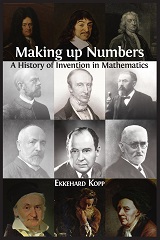
|
FreeComputerBooks.com
Links to Free Computer, Mathematics, Technical Books all over the World
|
|
- Title: Making up Numbers: A History of Invention in Mathematics
- Author(s) Ekkehard Kopp
- Publisher: Open Book Publishers (October 15, 2020); eBook (Creative Commons Licensed)
- License(s): CC BY 4.0
- Hardcover/Paperback: 280 pages
- eBook: HTML and PDF
- Language: English
- ISBN-10/ASIN: 180064096X
- ISBN-13: 978-1800640962
- Share This:

|
This book offers a detailed but accessible account of a wide range of mathematical ideas. Starting with elementary concepts, it leads the reader towards aspects of current mathematical research.
The book explains how conceptual hurdles in the development of numbers and number systems were overcome in the course of history, from Babylon to Classical Greece, from the Middle Ages to the Renaissance, and so to the nineteenth and twentieth centuries. The narrative moves from the Pythagorean insistence on positive multiples to the gradual acceptance of negative numbers, irrationals and complex numbers as essential tools in quantitative analysis.
This book will be of great interest to undergraduate and A-level students of mathematics, as well as secondary school teachers of the subject. In virtue of its detailed treatment of mathematical ideas, it will be of value to anyone seeking to learn more about the development of the subject.
About the Authors- N/A
 Similar Books:
Similar Books:
-
 Men of Mathematics: Great Mathematicians from Zeno to Poincaré
Men of Mathematics: Great Mathematicians from Zeno to Poincaré
This book provides a rich account of major mathematical milestones, from the geometry of the Greeks through Newton’s calculus, and on to the laws of probability, symbolic logic, and the fourth dimension.
-
 Essays on the Theory of Numbers (Richard Dedekind)
Essays on the Theory of Numbers (Richard Dedekind)
This book contains the two most important essays on the logical foundations of the number system by the famous German mathematician J. W. R. Dedekind. The contents of these essays belong to the foundations of mathematics and our number system.
-
 How We Got from There to Here: A Story of Real Analysis
How We Got from There to Here: A Story of Real Analysis
This book is an introductory real analysis textbook, presented through the lens of history. The definitions and techniques are motivated by the actual difficulties encountered by the intuitive approach and are presented in their historical context.
-
 Mathematical Discovery (A.M. Bruckner, et al)
Mathematical Discovery (A.M. Bruckner, et al)
A course introducing the idea of mathematical discovery, especially to students who may not be particularly enthused about mathematics as yet, in which the students could actually participate in the discovery of mathematics.
-
 Mathematical Omnibus: Thirty Lectures on Classic Mathematics
Mathematical Omnibus: Thirty Lectures on Classic Mathematics
This is an enjoyable book with suggested uses ranging from a text for a undergraduate Honors Mathematics Seminar to a coffee table book. The common thread in the selected subjects is their illustration of the unity and beauty of mathematics.
-
 Street-Fighting Math: Guessing & Opportunistic Problem Solving
Street-Fighting Math: Guessing & Opportunistic Problem Solving
This engaging book is an antidote to the rigor mortis brought on by too much mathematical rigor, teaching us how to guess answers without needing a proof or an exact calculation.
-
 What is Mathematics: Godel's Theorem and Around (K. Podnieks)
What is Mathematics: Godel's Theorem and Around (K. Podnieks)
This accessible book gives a new, detailed and elementary explanation of the Godel incompleteness theorems and presents the Chaitin results and their relation to the da Costa-Doria results, which are given in full, but with no technicalities.
-
 Mathematics in the Age of the Turing Machine (Thomas C. Hales)
Mathematics in the Age of the Turing Machine (Thomas C. Hales)
Computers have rapidly become so pervasive in mathematics that future generations may look back to this day as a golden dawn. The article gives a survey of mathematical proofs that rely on computer calculations and formal proofs.
-
 Street-Fighting Math: Guessing & Opportunistic Problem Solving
Street-Fighting Math: Guessing & Opportunistic Problem Solving
This engaging book is an antidote to the rigor mortis brought on by too much mathematical rigor, teaching us how to guess answers without needing a proof or an exact calculation.
-
 A Beautiful Math: John Nash, Game Theory, and a Code of Nature
A Beautiful Math: John Nash, Game Theory, and a Code of Nature
Today neuroscientists peer into game players brains, anthropologists play games with people from primitive cultures, biologists use games to explain the evolution of human language, and mathematicians exploit games to better understand social networks.





